You are using an out of date browser. It may not display this or other websites correctly.
You should upgrade or use an alternative browser.
You should upgrade or use an alternative browser.
Since it's been a while since we had an Israel/Palestine thread...
- Thread starter Mr. Tea
- Start date
-
- Tags
- barf emoji basking perchance childlike tripe craner's been mossad from day one dissensus gets fatwa'd fatwa sex hmt govt hat keinen schwand jamaican voodoo gang from predator 2 knob v cretin linebaugh's balls ground into dust mixed biscuits is a virgin but he has clamydia nastiness new tab for trotsky proxy wars pussyclaat voodoo gang from predator 2 strictly for the consequentialist tea and biscuits the cancellation of stan the fundamentalist core of mr tea the hegel reference the lust to execute oliver craner the mythifus of sisyphus third cares for his okra third neglects his okra third puts okra up his bum underschooled undergrads
D
droid
Guest
Im not here to spoonfeed you!
I think Avi Shalim mentions it in 'War and peace in the middle east', also this recent Guardian article. There may be somethng in the recent book whose name escapes me, but Ive only flicked through it.
http://www.guardian.co.uk/world/2009/jan/07/gaza-israel-palestine
Cant remember anything from Khaldi. Havent read him for at least 5 years.
I think Avi Shalim mentions it in 'War and peace in the middle east', also this recent Guardian article. There may be somethng in the recent book whose name escapes me, but Ive only flicked through it.
http://www.guardian.co.uk/world/2009/jan/07/gaza-israel-palestine
...Like other radical movements, Hamas began to moderate its political programme following its rise to power. From the ideological rejectionism of its charter, it began to move towards pragmatic accommodation of a two-state solution. In March 2007, Hamas and Fatah formed a national unity government that was ready to negotiate a long-term ceasefire with Israel. Israel, however, refused to negotiate with a government that included Hamas.
It continued to play the old game of divide and rule between rival Palestinian factions. In the late 1980s, Israel had supported the nascent Hamas in order to weaken Fatah, the secular nationalist movement led by Yasser Arafat...
Cant remember anything from Khaldi. Havent read him for at least 5 years.
crackerjack
Well-known member
Seeing this
http://www.timesonline.co.uk/tol/news/world/middle_east/article5521925.ece
made me wish this was for real
The main UN compound in Gaza was in flames today after being struck by Israeli artillery fire, and a spokesman said that the building had been hit by shells containing the incendiary agent white phosphorus.
The attack on the headquarters of the UN Relief and Works Agency (UNRWA) came as Ban Ki Moon, the UN Secretary-General, arrived in Israel on a peace mission and plunged Israel's relations with the world body to a new low.
http://www.timesonline.co.uk/tol/news/world/middle_east/article5521925.ece
made me wish this was for real
D
droid
Guest
made me wish this was for real
Funnies.
This one is a bit too close to the truth though - talk about overkill...
Yeah, that shit is so grim. Because the sites were shelled, the body parts scattered for meters. There are reports of nearby residents finding entrails, hands, etc. on their roof tops.
That being said, they were probably finding those anyway. The newest statistics put Palestine's body count at over 1000, including at least 300 children.
They've gone and pissed bin-Laden off now too. Yesterday he made a statement encouraging Muslims to declare holy war on Israel.
It's a shame really. Although it looks like Ban Ki-Moon is brokering some sort of truce deal, and even some members of Hamas have been hinting at possibilities of letting talks commence between the Palestinian Authority and Israel, this whole affair has pushed peace between Arabs and Jews much further away than it was before it all started. Some are saying decades away.
Even if Hamas takes a back seat, these atrocities have now galvanized people who otherwise opposed them to the point where now they are expressing outrage at the perceived complicity of places like Egypt (who in my opinion are complicit) and Jordan.
D
droid
Guest
From The Independent, 18th June 2008:
Wiki page listing rocket attacks from Gaza, 2008: http://en.wikipedia.org/wiki/List_of_rocket_and_mortar_attacks_in_Israel_in_2008
Wiki page listing rocket attacks from Gaza, pre-2008: http://en.wikipedia.org/wiki/List_of_Qassam_rocket_attacks[/IMG]
...A deal was agreed but Hamas did not stick to their side of the bargain, i.e. stopping the flow of rockets....
OK, first of all, what exactly do wikipedia graphs prove? Isn't it common knowledge that when it comes to politics wikipedia is notoriously unreliable for anything but the most basic and uncontroversial of details? Even if you accept this graph as proof it has no relevance to the period in question except to emphasise how successful the truce was.
Secondly, you have sidestepped the point I was making about the ceasefire so I will reiterate.
Let's start by having a look at the exact text of the 'understanding' which were recently released to the International Crisis Group.
1- Mutual agreement to cease all military activities by the start of “zero hour” on Thursday, June 19, at 6:00AM.
2- Duration of ceasefire is six months according to agreement concluded among the national parties under Egyptian auspices.
3- Ceasefire will be implemented under national consensus and under the Egyptian auspices.
4- After seventy two hours from the start of the ceasefire, the crossing points will be opened to allow 30% more goods to enter the Gaza strip.
5- Ten days after that (i.e., 13 days after ceasefire begins), all crossings would be open between Gaza and Israel, and Israel will allow the transfer of all goods that were banned or restricted to go into Gaza.
6- Egypt will work to expand the ceasefire into the West Bank later.
From the beginning of the ceasefire on June 19th there was a marked decrease in rocket attacks, in fact, between June 19th and November 4 there was a 98% decrease in rockets fired with no fatalities.

This was the longest period of calm since rocket attacks began in 2002. A success according to the IICC which (as already mentioned is a closely associated with the Israeli foreign ministry and the intelligence community):
So according to one of the most prominent anti-terror groups and an approved source of the Israeli foreign ministry, Hamas maintained the ceasefire, attempted to prevent rocket attacks which were launched in defiance of Hamas, and rocket attacks only restarted as a response to the Israeli incursion of November 4th.
This has all been partly confirmed by Mark Regev, spokesman for the Israeli prime minister in an interview on Channel 4 news.
Hamas for their part publicly condemned the al-Asqa Martyrs Brigade (a military splinter group of Fatah) launched rocket attacks of the week of June 23rd, "claiming that they were deliberately trying to wreck the fragile Gaza truce with Israel to "settle internal scores"." They also publicly reaffirmed their commitment to the ceasefire.
It's also worth mentioning here that Fatah groups such as Abbas's presidential guard and the "Preventive Security Force" headed by warlord Mohammad Dahlan had previously been armed and trained via Israel and had the political support of Israel and the US in their armed opposition against the elected Hamas government.
If there was any doubt whatsoever about Israel's support for Fatah fighters in the strip it was dispelled when150 Fatah supporters were allowed to enter Israel as a refuge following a Hamas crackdown - possibly including some members of the same groups that had been firing on Israel in defiance of Hamas' truce agreements.
Cont...
D
droid
Guest
As for Israel's side of the deal - on June 19th they did allow 30% more aid (not normal traffic - just humanitarian aid) into the strip but then restricted access for the remainder of the ceasefire after the first al-Asqa rockets were launched. Israel expanded the security zone at the border to 300 meters, entry into which was an automatic death sentence for Palestinians. Israeli officials acknowledged in June that "that they had no intention of opening the border crossings fully, even though they anticipated that this would be the source of serious conflict with Hamas... ...and in late July Foreign Minister Tzipi Livni declared that the border crossings should remain closed until Hamas agreed to the release of Gilad Shalit...", which was not a condition of the ceasefire.
Remember that the Israeli siege was a continuation of policies which were commenced prior to 'disengagement' from Gaza, and are in direct violation of International Humanitarian law and constituted collective punishment, condemned by the UN human rights council in January 07 (the 15th such condemnation on human rights in the occupied territories in the preceding 2 years). In March of the same year, aid agencies and NGO's such as Amnesty, CARE International UK, CAFOD, Christian Aid, Medecins du Monde UK, Oxfam, Save the Children UK and Trocaire issued the joint report 'The Gaza Strip: A Humanitarian Implosion':
Israeli human rights group B'tselem outlined these breaches of humanitarian law and the effects of the economic strangulation of Gaza even prior to the Hamas takeover in 2006, in their March '05 report 'The Gaza Strip - One Big Prison':
Even if you take the position (in conflict with official Israeli sources) that Hamas broke the ceasefire between June-November, and that Israel (in agreement with the ICG, Amnesty etc...) broke the ceasefire by refusing to ease the blockade, this contention is still nonsense. It appears that the understanding held, despite it's lack of perfection. Israel seemed to accept that Hamas was doing everything in its power to prevent rocket attacks (and the 98% reduction in attacks bears this out), and Hamas seemed willing to continue on this course despite Israel's continuing blockade.
This understanding ended on November 4th after an unprovoked Israeli raid on gaza (lets dispense with the preemptive 'tunnel/kidnapping' pretext nonsense) which killed 6 Palestinian militants and prompted a resumption of widescale rocket attacks and a closing of all borders, resulting in what a UN Human rights investigator described as 'severe and massive violations of international humanitarian law'.
(As an aside, there is an uncomfortable historical echo in the assertion that one Palestinian group broke a ceasefire (thus justifying retaliation) because an opposing group attacked Israel. In the summer of 1982 after attempting to provoke a response from the PLO by shelling southern Lebanon for over a year (in violation of ceasefire agreements), Israel finally launched it's brutal invasion in June - the stated pretext being the attempted assassination of the Israeli ambassador to London by the Abu Nidal group, who happened to be bitter opponents of the PLO. the real reason behind the attacks is sickeningly familiar:
The actual reasons for the 1982 invasion have never been concealed in Israel, though they are rated "X" here. A few weeks after the invasion began, Israel's leading academic specialist on the Palestinians, Yehoshua Porath, pointed out that the decision to invade "flowed from the very fact that the cease-fire had been observed" by the PLO, a "veritable catastrophe" for the Israeli government because ir endangered the policy of evading a political settlement. The PLO was gaining respectability thanks to its preference for negotiations over terror. The Israeli government's hope, therefore, was to compel "the stricken PLO" to "return to its earlier terrorism," thus "undercutting the danger" of negotiations. As Prime Minister Yitzhak Shamir later stated, Israel went to war because there was "a terrible danger.... Not so much a military one as a political one." The invasion was intended to "undermine the position of the moderates within [the PLO] ranks" and thus to block" the PLO `peace offensive'" and "to halt [the PLO's] rise to political respectability" (strategic analyst Avner Yaniv); it should be called "the war to safeguard the occupation of the West Bank," having been motivated by Begin's "fear of the momentum of the peace process," according to Israeli Arabist and former head of military intelligence Gen. Yehoshaphat Harkabi. US backing for Israel's aggression, including veto of Security Council efforts to stop the slaughter, was presumably based on the same reasoning.)
Had the Israeli Government’s primary concern been the safety of its citizens, it would have fulfilled its obligations under the ceasefire agreement – desisting from military actions against Gaza and lifting its economic blockade of Gaza. Had it done so, there was the strong possibilty that Hamas would have been prepared to maintain indefinitely the ceasefire that prevailed prior to 4 November... Israel claims (echoed by yourself) that it only wants to end the rocket attacks and protect it's citizens. If this is the case, then why have they continually refused and broken ceasefires which have been shown to be effective in achieving this exact aim, including their own unilaterally declared ones?
Cont...
Remember that the Israeli siege was a continuation of policies which were commenced prior to 'disengagement' from Gaza, and are in direct violation of International Humanitarian law and constituted collective punishment, condemned by the UN human rights council in January 07 (the 15th such condemnation on human rights in the occupied territories in the preceding 2 years). In March of the same year, aid agencies and NGO's such as Amnesty, CARE International UK, CAFOD, Christian Aid, Medecins du Monde UK, Oxfam, Save the Children UK and Trocaire issued the joint report 'The Gaza Strip: A Humanitarian Implosion':
Amnesty etc... said:The situation for 1.5 million Palestinians in the Gaza Strip is worse now than it has ever been since the start of the Israeli military occupation in 1967. The current situation in Gaza is man-made, completely avoidable and, with the necessary political will, can also be reversed.
Gaza has suffered from a long-term pattern of economic stagnation and plummeting development indicators. The severity of the situation has increased exponentially since Israel imposed extreme restrictions on the movement of goods and people in response to the Hamas take over of Gaza...
Israeli human rights group B'tselem outlined these breaches of humanitarian law and the effects of the economic strangulation of Gaza even prior to the Hamas takeover in 2006, in their March '05 report 'The Gaza Strip - One Big Prison':
...B'tselem said:Despite the easing of restrictions that Israel declared following the Sharm el-Sheikh summit in February 2005, there has been almost no improvement in the movement of Palestinians to and from Gaza, nor in the movement of goods. The report illustrates the extent to which Israel treats many fundamental human rights – among them the right to freedom of movement, family life, health, education, and work – as “humanitarian gestures” that it grants or denies at will...
...The strangulation of the Gaza Strip increased following Palestinian attacks against civilians in Israel and the Occupied Territories over the past few years. Targeting civilians is a “war crime” and never justified. Israel is entitled, even obligated, to protect its citizens. However, Israel’s right to self-defense does not permit it to trample on the rights of an entire population...
Vimothy said:Israel closed the borders in response to continued rocket attacksthat have (almost eight years after the first attacks) united Israeli society. And so for Hamas, either Gaza is their problem and they broke the ceasefire, or it is not their problem and they cannot claim a single counterterror operation as deus ex machina.
Even if you take the position (in conflict with official Israeli sources) that Hamas broke the ceasefire between June-November, and that Israel (in agreement with the ICG, Amnesty etc...) broke the ceasefire by refusing to ease the blockade, this contention is still nonsense. It appears that the understanding held, despite it's lack of perfection. Israel seemed to accept that Hamas was doing everything in its power to prevent rocket attacks (and the 98% reduction in attacks bears this out), and Hamas seemed willing to continue on this course despite Israel's continuing blockade.
This understanding ended on November 4th after an unprovoked Israeli raid on gaza (lets dispense with the preemptive 'tunnel/kidnapping' pretext nonsense) which killed 6 Palestinian militants and prompted a resumption of widescale rocket attacks and a closing of all borders, resulting in what a UN Human rights investigator described as 'severe and massive violations of international humanitarian law'.
(As an aside, there is an uncomfortable historical echo in the assertion that one Palestinian group broke a ceasefire (thus justifying retaliation) because an opposing group attacked Israel. In the summer of 1982 after attempting to provoke a response from the PLO by shelling southern Lebanon for over a year (in violation of ceasefire agreements), Israel finally launched it's brutal invasion in June - the stated pretext being the attempted assassination of the Israeli ambassador to London by the Abu Nidal group, who happened to be bitter opponents of the PLO. the real reason behind the attacks is sickeningly familiar:
The actual reasons for the 1982 invasion have never been concealed in Israel, though they are rated "X" here. A few weeks after the invasion began, Israel's leading academic specialist on the Palestinians, Yehoshua Porath, pointed out that the decision to invade "flowed from the very fact that the cease-fire had been observed" by the PLO, a "veritable catastrophe" for the Israeli government because ir endangered the policy of evading a political settlement. The PLO was gaining respectability thanks to its preference for negotiations over terror. The Israeli government's hope, therefore, was to compel "the stricken PLO" to "return to its earlier terrorism," thus "undercutting the danger" of negotiations. As Prime Minister Yitzhak Shamir later stated, Israel went to war because there was "a terrible danger.... Not so much a military one as a political one." The invasion was intended to "undermine the position of the moderates within [the PLO] ranks" and thus to block" the PLO `peace offensive'" and "to halt [the PLO's] rise to political respectability" (strategic analyst Avner Yaniv); it should be called "the war to safeguard the occupation of the West Bank," having been motivated by Begin's "fear of the momentum of the peace process," according to Israeli Arabist and former head of military intelligence Gen. Yehoshaphat Harkabi. US backing for Israel's aggression, including veto of Security Council efforts to stop the slaughter, was presumably based on the same reasoning.)
Had the Israeli Government’s primary concern been the safety of its citizens, it would have fulfilled its obligations under the ceasefire agreement – desisting from military actions against Gaza and lifting its economic blockade of Gaza. Had it done so, there was the strong possibilty that Hamas would have been prepared to maintain indefinitely the ceasefire that prevailed prior to 4 November... Israel claims (echoed by yourself) that it only wants to end the rocket attacks and protect it's citizens. If this is the case, then why have they continually refused and broken ceasefires which have been shown to be effective in achieving this exact aim, including their own unilaterally declared ones?
Time Magazine said:Mar. 13, 2008: Moving Toward an Israeli-Hamas Truce
When Palestinian militants this week laid down their terms for a cease-fire with the Israelis — an end to Israeli military operations in Gaza and in the West Bank, and the re-opening of borders into the besieged Mediterranean strip — it wasn't long before the Israelis responded.
In Bethlehem on Wednesday evening, Israeli agents disguised as Arabs and driving a car with a Palestinian license plate ambushed and killed four suspected militants, including a senior commander of Islamic Jihad...
MSNBC said:April 21, 2008: Hamas offers truce in return for 1967 borders
The leader of Hamas said Monday that his Palestinian militant group would offer Israel a 10-year "hudna," or truce, as implicit proof of recognition of Israel if it withdrew from all lands it seized in the 1967 Middle East War.
Khaled Mashaal told The Associated Press that he made the offer to former U.S. President Jimmy Carter in talks on Saturday. "We have offered a truce if Israel withdraws to the 1967 borders, a truce of 10 years as a proof of recognition," Mashaal said.
CS Monitor said:April 25th 08: Israel rejects Hamas cease-fire offer as humanitarian crisis deepens in Gaza
Israel rejected a cease-fire offer from the Palestinian group Hamas as a humanitarian aid crisis erupting in the Gaza Strip threatened wider instability. The crisis in the troubled Palestinian territory deepened as President Bush, meeting with Palestinian President Mahmoud Abbas in Washington, offered assurances that a two-state deal is possible before he leaves office in January.
Hamas offered a six-month truce to Israel on Friday if Israel would end a blockade it has imposed since June on the Gaza Strip, after Hamas seized the disputed territory...
Cont...
D
droid
Guest
Ma'an News said:Nov 23, 2008 Egypt reportedly brokers Hamas-Israel ceasefire, easing blockade of Gaza
Gaza – Ma’an – An agreement has been reached between Palestinian resistance factions in the Gaza Strip and Israel, Hamas announced on Sunday.
The agreement centers around a pledge to stop firing on Israeli targets in return for Israel opening crossing points into the besieged Strip, a top Hamas leader said.
Hamas official Ayman Taha announced that he had received a telephone call from Egyptian intelligence on Friday, which delivered a message from Israel asking that operations be scrapped in exchange for opening the crossing points...
YNET said:30 Dec, 08: UN official says Israel attacked during lull
Palestinians in Gaza believed Israel had called a 48-hour "lull" in retaliatory attacks with Hamas when Israeli warplanes launched a massive bombardment of Hamas installations in the Gaza Strip, a UN official said Monday.
Karen Abu Zayd, commissioner of the UN Relief and Works Agency (UNRWA) which helps Palestinian refugees, raised the possible violation of an informal truce in a video press conference with UN reporters from her base in Gaza...
IPS said:Jan 9, 2009 Israel Rejected Hamas Ceasefire Offer in December
WASHINGTON, Jan 9 (IPS) - Contrary to Israel's argument that it was forced to launch its air and ground offensive against Gaza in order to stop the firing of rockets into its territory, Hamas proposed in mid-December to return to the original Hamas-Israel ceasefire arrangement, according to a U.S.-based source who has been briefed on the proposal.
The proposal to renew the ceasefire was presented by a high-level Hamas delegation to Egyptian Minister of Intelligence Omar Suleiman at a meeting in Cairo Dec. 14. The delegation, said to have included Moussa Abu Marzouk, the second-ranking official in the Hamas political bureau in Damascus, told Suleiman that Hamas was prepared to stop all rocket attacks against Israel if the Israelis would open up the Gaza border crossings and pledge not to launch attacks in Gaza.
REUTERS said:Fri Jan 9: Israel rebuffs U.N. resolution, pursues Gaza war
Israel rejected a U.N. resolution calling for a ceasefire in the Hamas-ruled Gaza Strip on Friday and warplanes and tanks pounded the Palestinian enclave.
Israeli Prime Minister Ehud Olmert dismissed Thursday's binding Security Council resolution demanding an "immediate and durable" ceasefire in the two-week-old war as "unworkable."
PRESSTV said:Fri, 09 Jan 2009 : Israel pounds Gaza during truce hours
Israel has violated a three-hour truce declared to allow the passage of humanitarian aid, and has resumed attacks on the Gaza Strip.
Israeli troops violated the truce on Friday and continued their attacks on the costal sliver.
The cities of Jabaliya and Beit Lahiya in the north and the Zeitun neighborhood of Gaza City came under Israeli tank fire, witnesses said on Friday...
There is also the case of the Hamas ceasefire announced in February 05 which ended after the Israeli navy shelled a family picnic on Beit Lahya beach in June 2006.
Vimothy said:The wider context is the thousands of rockets fired into Israel since its unilateral withdrawal in 2006.
The 'wider context' as you put it, is not the use of almost completely ineffective terror tactics by Palestinians. As is plainly obvious to all but the ideologically blinkered, the 'wider context' is:
- The 40 year old occupation
- The continuing Israeli contempt for Palestinian life (approx 6000 killed since 2000, including 1500 minors)
- The continuing denial of Palestinian sovereignty and national rights
- The continuing denial of basic human rights in areas almost entirely controlled by Israel
- The continuing rejectionism by the US and Israel of the international, Arab and Palestinian consensus for a 2 state solution
- The continuing rejection by Israel of international law with the backing of the US and to a lesser extent the UK and Europe.
Since December 27th, Israel has wantonly bombed and attacked built up areas full of civilians. It's evacuating civilians into buildings and then shelling that building. It's refusing access of medical personnel and ambulances. It's starving surviving children in the process. It's shooting at medics and shelling hospitals. It's sniping and shooting at civilians holding white flags and children outside hospitals. It's using white phosphorous (classed as a chemical weapon when used against civilians), experimental weapons, and possibly depleted uranium. It's repeatedly attacking UN convoys and facilities used as refuges and storehouses for aid and medicine, despite being in constant contact with the UN at ground and government level. It's arresting reporters, refusing access to the international press and then attacking the press. Its arresting Israeli demonstrators and arab demonstrators, and excluding Arab parties from elections. In short it's engaging in wholesale slaughter of civilians and a multitude of war crimes, whilst its leaders call for the use of nuclear weapons, all as part of an operation that has been cynically timed for political reasons and has been planned since last March... And yet there are still moral morons out there who claim that Israel does not target civilians...
This is utterly indefensible terror, far far worse in scale and brutality than ANYTHING ever done by Palestinians to Israelis and the consequences for the region will be disastrous.
scottdisco
rip this joint please
Even if Hamas takes a back seat, these atrocities have now galvanized people who otherwise opposed them to the point where now they are expressing outrage at the perceived complicity of places like Egypt (who in my opinion are complicit) and Jordan.
Sick Boy OTM re Egypt.
what's this about my mate Brendan O'Neill?
D
droid
Guest
On top of everything else, it looks as if Israel is attempting to clear the border areas by transferring the population to create a new 'security zone'.
And from the same article: Is this the correct way to evacuate civilians?
Amira Hass makes some cogent observations:
And Thomas Friedman succinctly sums up Israeli policy towards civilians and its commitment to terror:
The IDF has also forced at least 40,000 people to leave their homes in agricultural and border areas. In Rafah, most of the 20,000 people removed from their homes were lodging with relatives and not in UNRWA facilities
http://74.125.77.132/search?q=cache...+posing+as+hamas+men&hl=en&ct=clnk&cd=7&gl=uk
And from the same article: Is this the correct way to evacuate civilians?
...Haaretz has also learned that one of the army's methods for evacuating a home is to fire a missile toward its upper level. That is how B.'s house in Sajaiyeh was destroyed. It was bombed just a few minutes after a missile struck and 40 shell-shocked family members walked out of the house...
Amira Hass makes some cogent observations:
And Thomas Friedman succinctly sums up Israeli policy towards civilians and its commitment to terror:
vimothy
yurp
Truce: http://www.guardian.co.uk/world/2009/jan/18/gaza-fragile-truth-and-fragile-future
Joe the Plumber is covering Gaza:
Re Friedman, Matt Taibbi's recent v. funny takedown: http://www.nypress.com/article-19271-flat-n-all-that.html
Joe the Plumber is covering Gaza:
Re Friedman, Matt Taibbi's recent v. funny takedown: http://www.nypress.com/article-19271-flat-n-all-that.html
crackerjack
Well-known member
Re Friedman, Matt Taibbi's recent v. funny takedown: http://www.nypress.com/article-19271-flat-n-all-that.html
Brilliant.
D
droid
Guest
So Israel manages to avoid any chance of even a medium term resolution by ignoring Hamas' conditions for a truce and declaring it's own unilateral ceasefire, the timing of which can leave no doubt as to the cynicism behind the entire brutal operation. And so, just like after previous attacks the blockade remains in place, and the already wretched Gazans will suffer even more and have no hope of rebuilding their shattered society.
Despite the head of the ICC claiming the court has no jurisdiction over Gaza, the Israelis are preparing for war crimes litigation:
Angry Arab is clear on the scale of Israel's defeat:
So the only question now is, what are Israelis going to do for entertainment now they can no longer watch 'highlights' on dedicated TV channels, or dance in celebration, or picnic on the hills around Gaza whilst cheering the slaughter of Palestinians?
Despite the head of the ICC claiming the court has no jurisdiction over Gaza, the Israelis are preparing for war crimes litigation:
Angry Arab is clear on the scale of Israel's defeat:
So the only question now is, what are Israelis going to do for entertainment now they can no longer watch 'highlights' on dedicated TV channels, or dance in celebration, or picnic on the hills around Gaza whilst cheering the slaughter of Palestinians?
D
droid
Guest
Excellent, clear and relatively concise Q+A on Znet which dispels many of the myths associated with Hamas and the recent conflict.
vimothy
yurp
Maybe that's because As'ad AbuKhalil is such an objective observer.
Interesting emerging trope that in Lebanon the Israelis were incompetent -- because they couldn't defeat Hezbollah -- but in Gaza they were brutes -- because they could defeat Hamas.
To take his points in turn:
1. Israel was not aiming at the total surrender of Hamas -- the organisation is conflicted between political and military wings, and most of its leadership live in Damascas away from the fighting. Which Hamas did Israel expect to surrender? And making this non-point that was never an Israeli goal the first point of your analysis -- what's up with that As'ad?
2. Agreed.
3. Well, if anything is clearer now that wasn't then, it is that Hamas are not Hezbollah. Hamas melted -- even its best units turned into air -- the resistance never resisted, and more Israelis were lost to friendly fire than were killed by Hamas's guns. Politically/stratgically, this was probably a foolish operation, but Israel annihilated them on the battlefield. What does that prove? Not that much. Hezbollah are much more competent than Hamas. Syria will probably take their Grads and give them to someone less useless in the future.
4. Agreed.
5. Too early to say. The IAF destroyed munitions and smuggling tunnels so reduced Hamas/PIJ/whoever's capacity to launch rockets -- we will surely see in the coming months whether Israel has managed to reduce the incidence of rocket fire from Gaza.
6. Isn't this the same as point 3 and point 1? It defeated Hamas on the battlefield with ease, but it was never likely that Hamas's leadership (in Damascus) would surrender.
7. See point 3.
8. Israeli intellignce assets in Gaza were obviously superior to those in Lebanon '06 -- I think that much is self-evident.
9. Agreed.
10. Agreed.
Interesting emerging trope that in Lebanon the Israelis were incompetent -- because they couldn't defeat Hezbollah -- but in Gaza they were brutes -- because they could defeat Hamas.
To take his points in turn:
1. Israel was not aiming at the total surrender of Hamas -- the organisation is conflicted between political and military wings, and most of its leadership live in Damascas away from the fighting. Which Hamas did Israel expect to surrender? And making this non-point that was never an Israeli goal the first point of your analysis -- what's up with that As'ad?
2. Agreed.
3. Well, if anything is clearer now that wasn't then, it is that Hamas are not Hezbollah. Hamas melted -- even its best units turned into air -- the resistance never resisted, and more Israelis were lost to friendly fire than were killed by Hamas's guns. Politically/stratgically, this was probably a foolish operation, but Israel annihilated them on the battlefield. What does that prove? Not that much. Hezbollah are much more competent than Hamas. Syria will probably take their Grads and give them to someone less useless in the future.
4. Agreed.
5. Too early to say. The IAF destroyed munitions and smuggling tunnels so reduced Hamas/PIJ/whoever's capacity to launch rockets -- we will surely see in the coming months whether Israel has managed to reduce the incidence of rocket fire from Gaza.
6. Isn't this the same as point 3 and point 1? It defeated Hamas on the battlefield with ease, but it was never likely that Hamas's leadership (in Damascus) would surrender.
7. See point 3.
8. Israeli intellignce assets in Gaza were obviously superior to those in Lebanon '06 -- I think that much is self-evident.
9. Agreed.
10. Agreed.
Last edited:
D
droid
Guest
Razor sharp analysis on Israels propensity to end ceasefires in fear of 'peace offensives'. the whole article is very much worth a read.
Thwarting Palestinian moderation
...The use of force by Israel to end unwanted ceasefires and avert the threat of Palestinian moderation has a long history. The most obvious example is the 1982 invasion of Lebanon, which killed some 20,000 people, overwhelmingly civilians. Launched on an even flimsier pretext than was the invasion of Gaza, the war’s objective was the “annihilation of the PLO”, which Israel did “not want as a partner for talks or as an interlocutor for any solution in the West Bank”. (Yoel Marcus, cit. Noam Chomsky, Fateful Triangle: The United States, Israel & The Palestinians, p. 199) Like the present-day Hamas, the PLO had scrupulously observed a ceasefire with Israel in the face of repeated Israeli violations, and, like Hamas, was becoming increasingly explicit about its acceptance of a two-state settlement. This political moderation terrified Israel into launching the invasion. As leading Israeli scholar Yehoshua Porath observed at the time, the decision to invade “flowed from the very fact that the cease-fire had been observed”. Arafat’s ability to enforce adherence to the truce for so long was “a veritable catastrophe in the eyes of the Israeli government” since it indicated that the PLO “might agree in the future to a more far-reaching arrangement”, leaving Israel unable to justify its rejectionism on the grounds that the PLO were merely “a wild gang of murderers”. It was thus the threat of PLO moderation that the invasion was “primarily designed to prevent”:
“The government’s hope is that the stricken PLO … will return to its earlier terrorism: it will carry out bombings throughout the world, hijack airplanes and murder many Israelis. In this way, the PLO will lose … political legitimacy … [and thereby undercut] the danger that elements will develop among the Palestinians that might become a legitimate negotiating partner for future political accomodations.” (cit. ibid., pp. 200-201)
As Israeli journalist Danny Rubinstein explained, the PLO “as an orderly political body is more terrifying to the government of Israel than the powerful terrorist PLO” because it undermines Israeli rejectionism. The only solution was to force it to revert to “murderous terror”. (cit. ibid., p. 201) The “terrible danger” posed by the PLO to Israel was, as Israeli Prime Minister Yitzhak Shamir stated, “[n]ot so much a military one as a political one”. Specifically, Israel feared the prospect of having to negotiate with any genuine Palestinian nationalist movement because, as Prime Minister Yitzhak Rabin explained, any such negotiations would “provide a basis for the possibility of creating a third state between Israel and Jordan”, a possibility that, as Rabin emphasised, Israel refuses to countenance. (Chomsky, Fateful Triangle, p. 70)
In short the invasion of Lebanon was, as Israeli strategic analyst Avner Yaniv describes, intended to crush the PLO’s “peace offensive” and “to halt [the PLO's] rise to political respectability” by undermining “the position of the moderates within [the PLO] ranks”.
Replace ‘the PLO’ with ‘Hamas’ and you’ve got a pretty accurate explanation of invasion and siege of Gaza. A key goal for Israel is the destruction of Hamas as a credible political force. As Livni recently explained:
“Hamas wants to gain legitimacy from the international community. Hamas wants to show that there is a place which is called the Gaza Strip, that this kind of an organization - an extremist Islamic organization that acts by terrorism and which is a designated terrorist organization - can rule. And to make it seem a legitimate regime. So they want the crossings to be opened, not only for the sake of the population, but because this symbolically is how they can show that the Gaza Strip has become a kind of a small state, which is controlled by them…
“[It is] important to keep Hamas from becoming a legitimate organization”.
This explains the findings of a recent study that “it is overwhelmingly Israel, not Palestine, that kills first following a lull. Indeed, it is virtually always Israel that kills first after a lull lasting more than a week.” In Livni’s words, an extended calm or truce “harms the Israel strategic goal, empowers Hamas, and gives the impression that Israel recognizes the movement”...
D
droid
Guest
but in Gaza they were brutes -- because they could defeat Hamas.
In Gaza, they were brutes because they indulged in wholesale slaughter and war crimes.
5. Too early to say. The IAF destroyed munitions and smuggling tunnels so reduced Hamas/PIJ/whoever's capacity to launch rockets -- we will surely see in the coming months whether Israel has managed to reduce the incidence of rocket fire from Gaza.
This is the important point isnt it? Hamas' military capabilities never extended to much more than the firing of rockets. It was obvious to all that they could never mount a successful resistance to a concentrated IDF air, naval and ground assault, so essentially, stopping rocket attacks meant defeating Hamas' militarily. This does not seem to have been achieved, but we shall see.
I think the main point he's trying to make is that despite their military ineffectiveness and the overwhelming odds against them, Hamas has continued to fight back. It may be the equivalent of a man scratching the leg of the person jumping up and down on his head, but what's important is the symbolism - the refusal to submit...
RE; political aims. Has Israel succeeded in reducing the plight of Gazans to a mere humanitarian issue rather than a Political one?
D
droid
Guest

Also note (as reflected in early UN figures) the redefinition of 'civilian'. Taking a leaf out of the American assault on Falluja - there are no longer any such thing as male civilians, just 'women and children'. Any man killed by Israel is automatically a terrorist or a legitimate target.
(EDIT - fixed the missing image)
Last edited by a moderator:
crackerjack
Well-known member
This seems fairly measured.
http://www.timesonline.co.uk/tol/news/world/middle_east/article5545555.ece
http://www.timesonline.co.uk/tol/news/world/middle_east/article5545555.ece
D
droid
Guest
The IDF leave their customary calling card. At least they didn't spread their shit all over the place like they usually do.
The Israelis used chemical weapons against refugees, children and the UN:
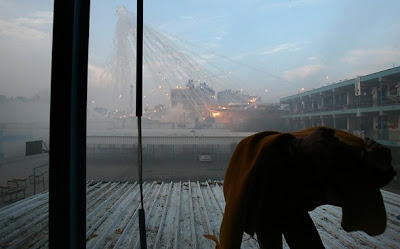
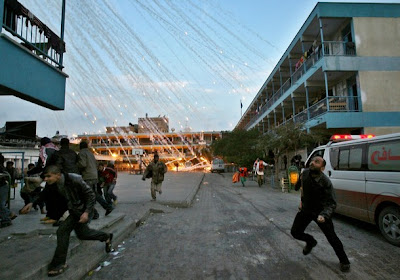
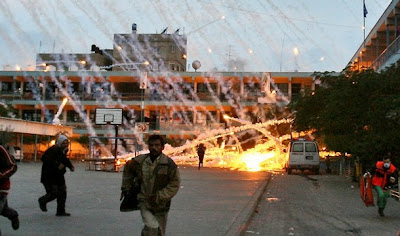
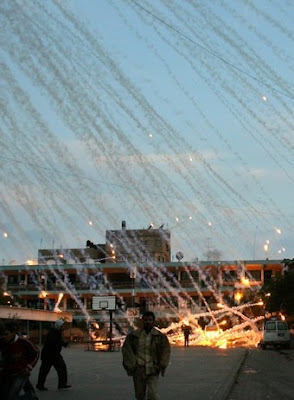
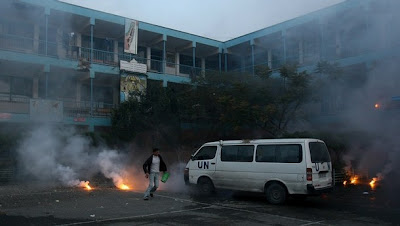
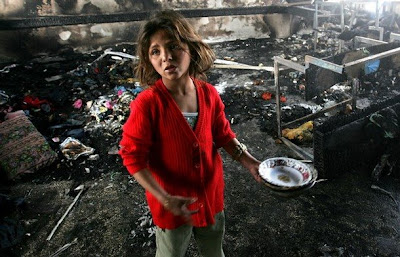
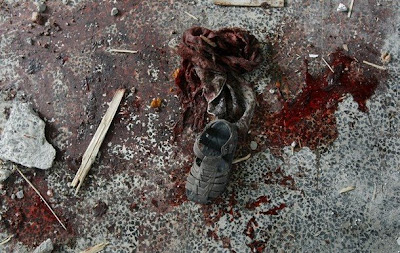
There's more on this link if you have a strong stomach.
Pictures of the UNRWA school hit by WP. If there could be any doubt about this its gone now.
The Israelis used chemical weapons against refugees, children and the UN:







There's more on this link if you have a strong stomach.
